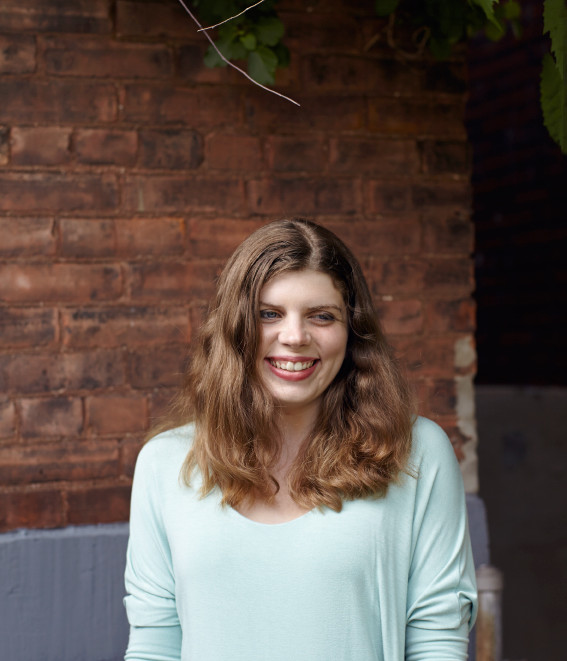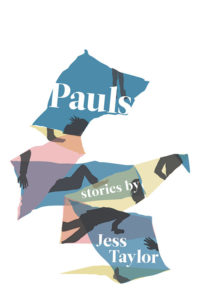
Jess Taylor, author of the short story collection Pauls from BookThug, is the judge of the inaugural Jacob Zilber Prize for Short Fiction (full contest details here). Curtis LeBlanc, PRISM international‘s Promotions Editor, had the opportunity to pick her brain on a few topics leading up to the contest deadline…
Jess Taylor is a Toronto writer and poet. She founded The Emerging Writers Reading Series in 2012 and is the fiction editor of Little Brother Magazine. She’s released two chapbooks of poetry, And Then Everyone: Poems of the West End (Picture Window Press, 2014) and Never Stop (Anstruther Press, 2014). This October, her first collection of short stories, Pauls, was published by BookThug. The title story from the collection, “Paul,” received the 2013 Gold Fiction National Magazine Award. Jess is currently at work on a second collection, Just Pervs; a novel, Where Everything Glows; and continuation of her life poem, Never Stop.
First things first. What’s up with the #athletics tweets?
Tonight was our next big game and we won!! Even though Kyle was out with a stomach bug! And I played!! #athletics
— Jess Taylor (@JessTaywriter) October 18, 2016
After I put out my book, I got really bored of the typical social-media game where people just self-promote or participate in topical discussions. Even regular joking seemed so serious and like something people would do to develop a cohesive identity or “brand”. So in September, I started to tweet about going back to school, and I was trying out for the team again, hoping to upgrade from MVP to Team Captain. Unfortunately, things weren’t going my way.
I’m back in action! Things will change once Kyle is back but I’m hoping this illness is going to last at least another practice! #athletics
— Jess Taylor (@JessTaywriter) October 18, 2016
Without Kyle it’s a whole different vibe, the team works as a unit with me as their gracious leader. #athletics
— Jess Taylor (@JessTaywriter) October 18, 2016
This was the most character-based series of tweets I’d done, but sometimes if I’m feeling sad, I dedicate my twitter to #catretweets and only retweet cats. I also may have a character account floating around out there. Currently, I’ve gone back to Serious Twitter because laughter died after Trump got elected. Maybe it will come back though.
What’s with Kyle? Why would anybody be on #teamKyle? Can’t everyone see that you’re the obvious choice for captain?
Kyle is a snake, but most snakes end up being popular, who knows why. Not everyone can see through their smiles and pats-on-the-back to see they are obviously snakes who care more about getting the girl than helping out the team. I have always been focused on leadership and bringing everyone together for a common goal: Wiping out the Whitehawks at the championship game.
These cold mornings add an extra strain to the team’s practices. With Kyle’s leadership, it’s hard to keep everyone motivated. #athletics
— Jess Taylor (@JessTaywriter) October 11, 2016
Outside of #athletics, you also write books. Your first one, a short story collection titled Pauls, was published by Bookthug in 2015 and the the buzz was more of a roar. How was the experience of publishing your fiction debut?
 The most exciting thing about publishing a book, for me at least, was seeing how people responded to it and if they understood the work. This was especially cool when they produced art where you could just tell they got the book. For instance, Sean Deakin made my book trailer, and the first time I saw it, I cried because I could tell he understood the stories. Same with the cover by Malcolm Sutton; it perfectly matched what I was going for. Then you hear from people who you didn’t expect to read it — for instance, my doctors read it (almost every doctor I’ve met either loves reading or writes on the sly). It’s cool having that point of connection for people, especially since understanding and connection are two driving forces for why I write.
The most exciting thing about publishing a book, for me at least, was seeing how people responded to it and if they understood the work. This was especially cool when they produced art where you could just tell they got the book. For instance, Sean Deakin made my book trailer, and the first time I saw it, I cried because I could tell he understood the stories. Same with the cover by Malcolm Sutton; it perfectly matched what I was going for. Then you hear from people who you didn’t expect to read it — for instance, my doctors read it (almost every doctor I’ve met either loves reading or writes on the sly). It’s cool having that point of connection for people, especially since understanding and connection are two driving forces for why I write.
Everyone talks about a post-book-depression or slump or whatever you call it, and I thought it was a myth. It is very very real. For the first time since I was 14, I wasn’t writing very much, and I just felt crummy overall. I got through it now, and I think it’s probably because, as a young writer, I saw putting out a book as a huge goal, The Only Goal. Then you reach it and are like, “Hm, now what?” and think you should probably feel more accomplished about the whole thing. Then you remember that writers don’t just write one book (typically), they write many, they keep going, and so you do.
You’ve published two poetry chapbooks: And Then Everyone: Poems of the West End (Picture Window Press, 2014) and Never Stop (Anstruther Press, 2014). You’ve also edited poetry collections for BookThug and Frog Hollow Press. How do poetry and prose influence one another in your writing?
I tend to like weirder poetry and poetry that pays close attention to sound, and while my work is more narrative-based, I think that the attention to sound is important in both my poetry and prose. I really pay attention to voice, the pattern of the language… Sometimes if I’m writing a story and it’s one of those rare ones that flows freely, it feels almost musical to me. Poetry and prose used to be very different impulses for me, but the more I write, the closer I feel they get.
I know a lot of really strong poets, and so editing collections of poetry and finding really great poems to support and showcase inspires me.
Should we expect a poetry collection from you in the near future? What do you have in the works for us?
Since 2013/2014, I’ve really only been writing one long poem called Never Stop, which Jim Johnstone edited into the chapbook for Anstruther. I’m hoping that will be a life poem that I just keep adding to and working on forever. The second volume has been in the works for over a year, which is about how long it took to write the material for the first one. I think about publishing poetry much differently from publishing prose. For instance, I’m much more interested in micropress publishing for poetry and am not really focused on putting out a book-length project. Maybe one day when I have enough of Never Stop.
I’m currently working on two book projects of fiction, though! The first is a novel called Where Everything Glows, which follows Paulina slightly after Pauls leaves her. It’s written in multiple voices and is dark and strange. The second is another collection of stories called Just Pervs, which are stories all about sex, especially female (hyper)sexuality. You can read “The Stink”, which came out in Taddle Creek, if you want a sense of that book.
You’re the fiction editor of one of the coolest publications around, Little Brother, but if I’m correct this will be your first experience judging an international literary contest. What can prospective submitters do to awe you with their stories?
Being bored is my nightmare, so I really like stories that are different. Submit work where you feel you’re being authentically yourself and have something genuine to say. I really like work that hits me emotionally or depicts people in a true, complicated way. Rather than enter something that you feel will impress others, submit work that you feel is missing in the world and a story you feel needs to be told. I look forward to reading all of your stories!
The deadline for the Jacob Zilber Prize for Short Fiction is January 15th, 2017. Submit online via Submittable and visit our Contests Page for complete contest guidelines.
We look forward to reading your work!
